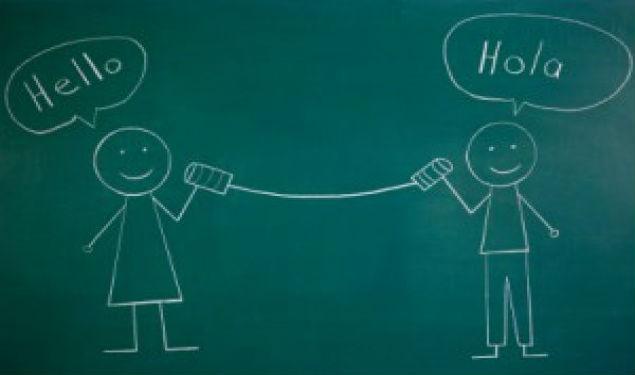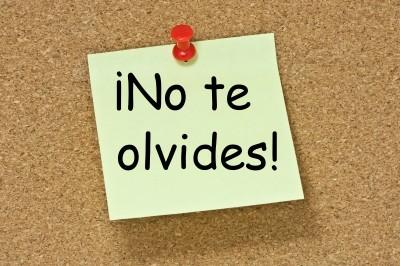
![]() Kathryn Stride
Kathryn Stride
 Para asegurar que un idioma se aprenda de forma natural, se hable sin acento y con fluidez, conviene iniciar el aprendizaje lo antes posible y de la manera más natural que se pueda.
Para asegurar que un idioma se aprenda de forma natural, se hable sin acento y con fluidez, conviene iniciar el aprendizaje lo antes posible y de la manera más natural que se pueda.
El proceso de aprendizaje de un idioma extranjero debería hacerse de igual modo y con la misma naturalidad que hicimos con nuestro idioma nativo.
Desde edades muy tempranas aprendemos a hablar un idioma sin necesidad ni presencia de texto escrito.
De bebés a medida que crecemos, observamos y escuchamos a nuestros padres tratando de imitar los sonidos que producen sus palabras. Repitiendo estos sonidos sin darnos cuenta vamos practicando la pronunciación, emitiendo y mejorando cada vez las palabras hasta que poco a poco vamos combinándolas entre sí para conseguir crear pequeñas frases con significado. Estas frases al mismo tiempo, dan paso a la formación de pequeños discursos, y así sucesivamente vamos desarrollando más dominio sobre nuestra lengua materna. Estamos aprendiendo a hablar un idioma sin involucrar contenido escrito.
Por todo esto, cuando tratamos de aprender un nuevo idioma deberíamos buscar todos los métodos disponibles a nuestro alcance que más se asemejen a la manera en que aprendimos nuestro idioma nativo de forma natural.
Si estamos estudiando un idioma, además debemos ofrecernos todas las posibilidades que nos ayuden a captar el idioma lo antes posible. Para ello lo principal es rodearnos y sumergirnos en el idioma extranjero que queremos aprender.
Exponte tanto como puedas a tu nuevo idioma, como:
Exponte al máximo en tu día a día al nuevo idioma que estás aprendiendo.
¡Incluso si puedes sueña solamente en tu nuevo idioma!

![]() Kathryn Stride
Kathryn Stride
 Todo el mundo puede aprender un idioma diferente si se lo propone. Es solo cuestión de motivación o necesidad. Condiciones adecuadas y sobre todo practicar el idioma extranjero con frecuencia son los factores determinantes para el buen aprendizaje de la lengua.
Todo el mundo puede aprender un idioma diferente si se lo propone. Es solo cuestión de motivación o necesidad. Condiciones adecuadas y sobre todo practicar el idioma extranjero con frecuencia son los factores determinantes para el buen aprendizaje de la lengua.
Cualquiera puede aprender un idioma extranjero, independientemente del sexo o la edad. Es cierto que a medida que nos hacemos más mayores, parece que disminuye nuestra habilidad para aprender, pero no se trata de un motivo importante, y hemos de pensar que nunca es demasiado tarde.
La edad supuestamente podría afectarnos a nuestra pronunciación o al acento, siendo más costoso deshacernos del acento nativo al hablar en un segundo idioma. El idioma nativo está más establecido en adultos que en niños. Incluso puede darse el caso en edades infantiles que se llegue a olvidar la lengua materna por falta de uso.
La edad no afecta a las funciones de vocabulario y la gramática, ya que suelen permanecer intactas a pesar de tener una edad más avanzada, pero sí que tenemos que tener en cuenta un aumento en la dificultad a la hora de la representación y la producción de sonidos.
Un dato a favor del aprendizaje de idiomas es que la práctica de cambiar de un idioma a otro ralentiza los efectos negativos de la edad sobre el cerebro.
¿Cómo influye si eres chico o chica?, pues según diferentes estudios, se ha comprobado que el cerebro masculino y el cerebro femenino se desarrollan de forma diferente. ¡Siempre se ha dicho que el cerebro del hombre y de la mujer es diferente :)!
Al parecer, los chicos y las chicas siguen distintas pautas en el uso del hemisferio derecho o izquierdo cuando se trata de hablar un idioma. Aunque no hay una confirmación sobre si hombre o mujer lo tiene más fácil para aprender.
Un factor influyente a la hora de aprender un idioma es que las personas extrovertidas avanzan más rápidamente que aquellas más tímidas, y esto es debido a que las extrovertidas no temen lanzarse a practicar la lengua, mientras que las tímidas terminan practicando mucho menos porque sienten vergüenza a equivocarse. ¡Fuera miedos!
Aprender un idioma nuevo solo depende de nosotros mismos, nuestra motivación, el talento y la frecuencia con que utilicemos el idioma. ¡Así que a practicar!

![]() Kathryn Stride
Kathryn Stride

Para todos los que estamos aprendiendo un idioma esto nos vendría muy bien, ¡verdad!
Seguro que alguna vez hemos pensado que tenemos mala memoria.
Se me ocurren varios casos, como por ejemplo, ir a la compra y al llegar a casa descubrir que se nos ha olvidado algo. O cuando nos toca pedir en el bar y al llegar a la barra ya no recordamos las bebidas. O cuando nos presentan a alguien por primera vez y sentimos vergüenza porque durante la conversación no podemos recordar su nombre de hace un momento. Recordar un número de teléfono, una nueva palabra de vocabulario en idioma diferente, etc...
En ocasiones, lo que solemos hacer para ayudarnos a recordar mejor es utilizar la repetición.
Por ejemplo en el caso referente a recordar el nombre de una persona que nos acaban de presentar, sería introducir (repetir) varias veces su nombre durante la conversación. Si queremos aprender un número de teléfono, contraseña, o lo que sea, lo repetimos varias veces para que se nos quede grabado. O en nuestro intercambio de idiomas, a la hora de aprender una nueva palabra, tratamos de utilizarla repetidas veces para que finalmente se nos quede como parte de nuestro vocabulario.
Dormir lo suficiente y descansar la mente, una buena alimentación, hacer deporte, practicar la meditación, o disponer de una red social amplia son factores que harán que tengamos mejor memoria.
Además, hay que tener en cuenta que también podemos ayudar a desarrollar y mejorar la memoria empleando algunas técnicas.
1.-Por asociación e imaginación. Conectando lo que estás tratando de recordar a elementos relacionados.
2.-Troceando la información. A veces si troceamos la información es más fácil la memorización (aprender un número de teléfono)
3.-Agrupando la información. Cuando la información viene demasiado fraccionada, entonces es mejor si la agrupamos en pequeños grupos. (Ejemplo: Aprender una cadena de números)
4.- Aplicando un ritmo o una rima. Es más fácil memorizar un texto si se le pone música o entonación. (Recitar una canción o una poesía)
5.-Recordando el contexto. Visualizando el momento en el que estábamos aprendiendo eso que queremos recordar.
6.-Exagerando. Si hacemos de la información algo original o absurdo será más fácil retenerlo en nuestra memoria.
7.- Entrenando el cerebro con juegos mentales. La mente también necesita de entrenamiento y estimulación.
Ya sabéis algunos trucos para recordar vuestro vocabulario nuevo, sin olvidarnos de un dato curioso, y es que al parecer según un estudio publicado por el British Journal of Clinical Pharmacology (en febrero de 2013) comer chocolate favorece nuestra memoria, debido a un componente que contiene el cacao (los flavonoles). Se les relaciona con un mejor funcionamiento cognitivo, favoreciendo la generación de neuronas y promoviendo cambios en las áreas relacionadas con el aprendizaje y la memoria. ¡Pero no os paséis comiendo:)!
©2025 LanguageLinker.com · Todos los derechos reservados